When I was in 10th grade, I bought a fiberglass fly rod and Pflueger Medalist reel and decided to try my luck at fly fishing for trout. It felt like a natural progression, having already spin-fished for bluegills in ponds, and bait-cast for bass and pickerel in lakes. Now it was time to cast flies into rivers for pretty fish that ate bugs. But I knew little about how to catch trout, except from what I had gleaned from a few Field and Stream articles with banner headlines like: “Ten Tips for Giant ‘Bows!”
I pedaled my bike to a stocked stream a few miles from my parents’ house in suburban New Jersey, then wandered along the banks making tentative casts with a wet fly. Eventually, I came to a slow pool with an old flood control wall slumped against the shoreline. I picked my way along, gazing into the clear water. To my joy, I spotted a dozen large fish holding in the shadow of the wall. Some looked nearly two feet long. Clearly, it was a school of those enormous rainbows I had been reading about.
I stripped out line and made a down-and-across cast bracing for a hard strike. But the fish ignored the fly. So I cast again. Still nothing. I cast again and again and again. Nothing. Nothing. Nothing. I began frantically changing flies, twitching them inches away from the fishes’ snouts. Utter indifference. It was as if the fish were zombies or perhaps river rocks shaped like trout. Then an older angler walked up to the pool with a spinning rod.
“Get any?” he asked. I told him no but excitedly pointed out the school of huge trout.
He looked in the water, sneered, and said: “Those aren’t trout! They’re suckers!” adding with a laugh: “They don’t hit!” Cue the sad trombone ...
At that point in my young angling career, I admit I hadn’t even heard of suckers. Now I knew these large zombie-fish were apparently not even worth a cast. Just the name alone sounded like something to avoid – suckers … gross!
But it turns out the old man was wrong about them not hitting. Kind of. Suckers do occasionally grab weighted nymphs – usually to the chagrin of a high-sticking trout angler. Friends have told me stories of hooking what at first they thought was the trout of a lifetime, only to see an oversize brownish-yellow fish loll on the surface with their fly dangling from its namesake suction-cup mouth. Or sometimes they would foul-hook one on a streamer stripped near the bottom. After an initial panicked surge, the fish would flag revealing the ruse. More sad trombone. Damn suckers.
One time though, I decided to try to eat one. It was mid-March, and I heard that suckers staged at creek mouths prior to spawning, and that early season fish were not bad eating. So, a friend and I packed in a camp stove and skillet to where a large stream entered the Delaware River. Since this was a meat trip, I drifted a worm with spilt shot and soon had a solid take. After what I can best describe as a forgettable fight, I landed a 16 incher that I bonked on the head and fileted. Then I sauteed it in onions and bacon and we ate it shore-lunch style. It was firm and flaky and pretty soon we had devoured everything except its unscaled skin.
Kind of tasty, those suckers.
The fish we ate that day was a white sucker, a ubiquitous species found from Labrador to New Mexico. But there are many other kinds. It turns out North America is the Amazon rainforest for sucker diversity, with some 78 of the world’s 80 known species found here. Angling author and fishing friend Matt Miller, a proud sucker champion and advocate, says his favorite is the largescale found in his local waters in Idaho. He describes it as hard-fighting and aggressive, yet difficult to fool. His holy grail though is the blue sucker, which he hasn’t yet caught and describes as perhaps more difficult to hook than Atlantic salmon. Matt also points out that many sucker species need clean, free-flowing rivers just like native trout, salmon, and steelhead, and are therefore impacted by the usual suspects – dams, dewatering for irrigation, and climate change. Ergo, if you protect suckers and their habitat, you may be safeguarding other more celebrated “gamefish,” too.
So, suckers are kind of cool.
A few weeks ago, and several decades after that first try with a fly rod, I found myself prospecting along an unstocked and overlooked wild trout stream. On a previous trip, I had released a few 10-inch browns, but felt that the creek, which featured deep logjams and juicy undercut banks, may have been holding out on me. The water ran low and clear that day, with a bright sun bearing down – bad conditions for fooling wild trout. I eventually came to a slow run and there on the bottom, perhaps 50 white suckers had gathered. The fish seemed semi-spooked by my presence, periodically dashing around, and re-ordering their ranks like a version of musical chairs.
Then I saw it: holding among the suckers swam a large wild brown – easily twenty inches long. The big trout had presumably taken up with the sucker school to protect itself – a safety-in-numbers strategy. Without the suckers as cover, the brown would have certainly been holed up deep in a logjam or under the bank, where I never would have seen it. I didn’t bother casting to the nervous fish, which was now darting around with the suckers, but now I knew its precise address. I would return on a better day, perhaps when the water was high and stained, armed with a weighted streamer. Or I could dead drift an egg fly when the suckers spawn in the riffles and the trout would hold behind them scarfing down dislodged eggs. Maybe I’d wait for a spinner fall and stalk the big brown sipping spent mayflies at last light. Whichever the case, I filed the location in a lockbox that I would open at a day and time of my choosing.
And for that I say: thank you, suckers.




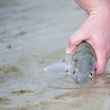

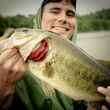





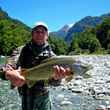







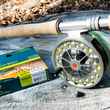




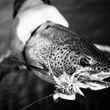




Comments
Jon B. Tobey replied on Permalink
In NH, the fish they call "sucker" is a Mountain Whitefish. A salmonid. Those suckers will take a fly out of the air and fight like a rainbow. I always let myself believe they are trout, right up until I let them go. Had many a good day on them.
Paul Quinnett replied on Permalink
Good story well told. Hurrah for all the fishes!
Klaas Hutter replied on Permalink
Some of the best trout fishing is during sucker spawn. Big trout will hold below the spawning suckers and take egg flies. When the suckers are releasing eggs, multiple large trout will make the water swirl chasing eggs.
Pages